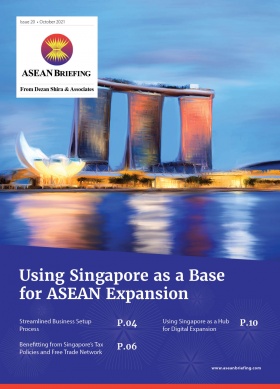What Support is Available for Singapore Companies to Expand Overseas?
The Market Readiness Assistance (MRA) grant and the Double Tax Deduction Scheme for Internationalization (DTDi) are two programs that assist Singaporean small and medium-sized enterprises (SMEs) to expand their business overseas.
What support will SMEs receive through the MRA?
The MRA was introduced in 2013 and provides funding of up to 70-80 percent of eligible costs for overseas expansion that covers market promotion, business development, and market set-up. In budget 2021, the government announced an enhancement to 80 percent until March 31, 2022, after which it will revert to 70 percent until March 31, 2023.
Eligible SMEs will receive the following support:
Up to 80 percent of eligible costs (until March 31, 2022), capped at S$100,000 (US$74,328) which covers:
- Overseas market promotion – capped at S$20,000 (US$14,866);
- Overseas business development – capped at S$50,000 (US$37,165); and
- Overseas market set-up – capped at S$30,000 (US$22,300).
How can businesses be eligible for the grant?
To be eligible, the applicant must be a company incorporated in Singapore with at least a 30 percent local shareholding.
The applicant must also not have overseas sales exceeding S$100,000 (US$74,328) in the last three preceding years at the time of application. Moreover, the annual company/group turnover must not be more than S$100 million (US$74.3 million) or the company/group must not employ more than 200 employees.What support is available under the DTDi?
The DTDi provides a 200 percent tax deduction on qualifying market expansion and investment development expenses. This is subject to approval from Enterprise Singapore (ESG) or the Singapore Tourism Board (STB).
The DTDi supports businesses in four categories and several sub-categories:
- Market preparation
-
- Product/service certification;
- Feasibility studies; and
- Design of packaging for the overseas market.
- Market exploration
-
- Overseas market development trips;
- Local trade fairs;
- Virtual trade fairs; and
- Overseas trade fairs.
- Market promotion
-
- Overseas advertising;
- Production of corporate brochures for overseas distribution;
- Overseas business development; and
- Advertising in approved trade publications.
- Market presence
-
- Overseas trade offices;
- Investment feasibility studies;
- Employee overseas posting;
- Master licensing and franchising; and
- Overseas investment study trips.
The specific expenses to participate in virtual trade fairs cover:
- Third-party costs for the design and production of digital promotion materials for virtual trade fairs;
- Logistic costs incurred to ship materials/samples to potential clients met through virtual trade fairs; and
- Fees charged by event organizers for virtual exhibition halls, booths, webinars, conferences, and speaking slots.
The ESG also has a list of qualifying activities that do not require prior ESG approval to receive the 200 percent tax deduction. This only applies to the first S$150,000 (US$111,487) of eligible expenses.
About Us
ASEAN Briefing is produced by Dezan Shira & Associates. The firm assists foreign investors throughout Asia and maintains offices throughout ASEAN, including in Singapore, Hanoi, Ho Chi Minh City, and Da Nang in Vietnam, Munich, and Esen in Germany, Boston, and Salt Lake City in the United States, Milan, Conegliano, and Udine in Italy, in addition to Jakarta, and Batam in Indonesia. We also have partner firms in Malaysia, Bangladesh, the Philippines, and Thailand as well as our practices in China and India. Please contact us at asia@dezshira.com or visit our website at www.dezshira.com.







